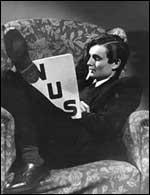Klaus Tennstedt's peerless interpretation.
Wagner: Siegfried's Tod und Trauermarsch
Monday, 28 January 2008
Posted in: Monday: Classical, tennstedt, wagner | 1 comments | Email This
Chopin Etudes: Op 25, nos 6 & 7
Monday, 31 December 2007
It's New Year's Eve, I've run out of drink and I feel jaded. Nothing can refresh my palate better than Valentina Lisitsa playing Chopin. Rehydration for the soul.
Posted in: chopin, Monday: Classical, valentina lisitsa | 0 Comments | Email This
Bach: Christmas Oratorio
Monday, 24 December 2007
Bach's Weihnachtsoratorium. John Eliot Gardiner conducting (good man) and the wonderful Bernarda Fink singing.
It's not the most heart-tearing performance, but it's good and it suits the seasonal mood perfectly.
Merry Christmas all.
Posted in: Bach, Monday: Classical, weihnachtsoratorium | 0 Comments | Email This
Sibelius: Violin Concerto (Oistrakh)
Monday, 17 December 2007
A very long time ago, I saw my then girlfriend's mother heading towards me down the High Street of my home town. She had not clapped her hate-filled eyes on me, and I certainly did not want to look closely into them. So I took the only manly course available to me and dived in through the doors of Woolworth's.
Whilst in there I bought a copy of Beethoven's Violin Concerto, played by David Oistrakh. It was one of the first Compact Discs I ever bought and I was astonished by the quality and the texture of his playing.
I've been a big fan ever since, not least because he saved me from running headlong into The Woman Who Could Have Been My Mother-in-Law; but if I had to choose a favourite performance, it would be of Oistrakh playing Sibelius's Violin Concerto. Above he's giving an incredible peformance of it with the Moscow Radio Symphony Orchestra, directed by Gennady Rozhdestvensky.
Posted in: Monday: Classical, oistrakh, sibelius | 0 Comments | Email This
Ligeti: Poème Symphonique pour 100 métronomes
Monday, 10 December 2007
I normally hate experiments of this kind, but I do have a sneaking admiration for György Ligeti's Poème Symphonique pour 100 métronomes.
The idea is clever, but simple. You take 100 metronomes, wind them all up and set them to different speeds. Then you set them all off at roughly the same time (you'll see a mechanical contraption at work in the film) and let your audience make of it what they will.
There are several things I like about the performance. Firstly, the symmetrical arrangement of the metronomes themselves appeals to my sense of shape. Secondly, it's fascinating to listen as the faster metronomes wind down, allowing you increasingly to pick out the sound of individual 'instruments'. And finally, it's stimulating to listen to the variations in the click, clack, clatter and remember similar sounds: I could pick out the beat of the rain on a split windscreen; the tackety-click of a typing pool in a black and white film; the pattering of boys drumming on desks; someone trampling on polystyrene egg-boxes; and much more.
Enjoy it: it's a lot less disturbing than the video someone has made to accompany Apparitions for Orchestra.
If you are new to Ligeti, your best bet is to get hold of one or more volumes of The Ligeti Project.
Posted in: ligeti, Monday: Classical | 0 Comments | Email This
Glenn Gould: Bach's Goldberg Variations
Monday, 3 December 2007
Jerome K. Jerome wisely pointed out that you could either be a rider of bicyles, or someone who overhauled them. He knew it was folly to mix the two enthusiasms.
It's the same with people enjoy music. There are those who quest for technical perfection, both in performance and recording, and others who simply enjoy listening to music that lights the touchpaper of thought and emotion.
I'm squarely in the latter camp. I couldn't give a donkey's toenails whether a piece is technically irreproachable and recorded with glacial clarity. What I'm interested in is how it is interpreted. And if something wonderful is played to me amidst the (digitally remastered) scratches and crackpopples of a 78rpm record - like Beecham's breathtaking Zauberflöte - then that's just fine by me.
Even so, nothing prepared me for my first encounter with Glenn Gould. Sure, I'd listened to and admired lots of Bach. I'd also listened to enough pianists that I was starting to pick out favourite performers, notably Vladimir Ashkenazy, Maria João Pires and - above all - Clifford Curzon.
Then, when I was 15 years old, someone lent me a tape of Glenn Gould playing this interpretation of Bach's Goldberg Variations. Listening to it was like sitting in a bathtub filled with sweet cocktails whilst someone chucked in a three-bar fire.
Yes, you can hear Gould humming. But I'd rather listen to that any day than endure the coughs of the concert hall, or witness the smug little notes that vulgarians pass from one to another when listening to classical music in public.
Listen. Hum yourself. Then, when you're thoroughly hooked, go and listen to this and watch all of these. And remember that perfection is always flawed.
Although I most admire Gould's 1981 recording of the Goldberg Variations, I strongly recommend you compare it with his groundbreaking 1951 performance. The differences of style and insight between the two are startling.
Posted in: Bach, Classical, Glenn Gould, Monday: Classical | 0 Comments | Email This
